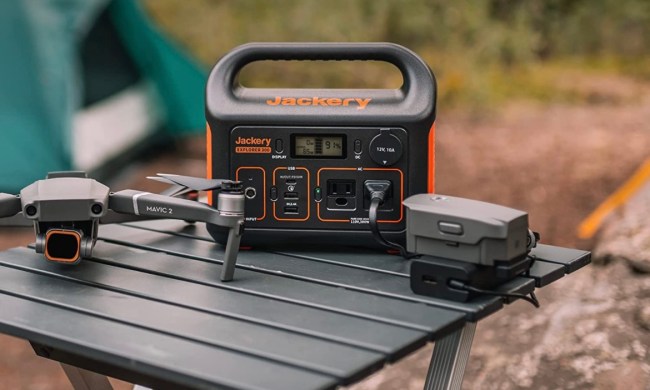This content was produced in partnership with EcoFlow.
EcoFlow is on a mission to change the way we see and utilize power, through its environmentally friendly, portable power offerings, and in its competitive market, they’ve successfully revolutionized home energy management via the Smart Home ecosystem. Above all, EcoFlow provides an intelligent home power backup solution, which gives anyone welcome stability in a time of unreliable power performance — blackouts are happening more frequently and electricity bills are soaring due to a global energy crisis. As is to be expected, EcoFlow is continuing that core mission with the launch of the DELTA 2, providing both a reliable and practical energy source to families the world over. The DELTA 2 is a “mainstream essential appliance for every family” that offers as much versatility, if not more, than its previous products. Moreover, the DELTA 2 is as suitable for off-grid adventures and the great outdoors as it is for at-home and residential use, but it’s also the best 1kWh portable power station on the market and is a huge step up from EcoFlow’s DELTA — the original model.
The prevailing idea behind EcoFlow’s newest and most powerful DELTA 2 is energy freedom, and it delivers all of that, and more.
Meet the latest member of EcoFlow’s DELTA family
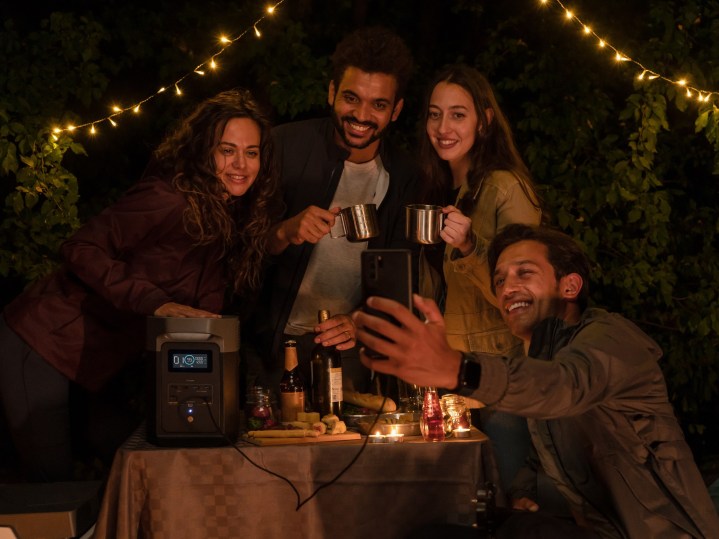
EcoFlow introduced the original DELTA portable power station back in 2019, which quickly became a consumer favorite, setting the standard in the industry. Now, three years later, EcoFlow is introducing the next generation of DELTA products — the DELTA 2. It’s, hands down, the best 1kWh portable power station, that is so much more than just a battery, and, of course, EcoFlow is once again setting a high bar.
The DELTA 2 is a portable power station, much like what EcoFlow has offered in the past. It has a 1,024-watt-hour capacity, but when paired with extra batteries as part of the brand’s expandable capacity system, that can be increased to 2,048-watt-hours or 3,040-watt-hours, anytime. All you have to do is grab the DELTA 2 Extra Battery or the DELTA Max Extra Battery and connect them. So, if you find that you need more power in a pinch, you’re not locked in or limited in any way — you can just expand. But that also means when you’re traveling, off-grid, or out doing something similar, you can decide just how much you want to pack and bring with you. Maybe you don’t need those extra batteries and want to pack light? Cool, you can do exactly that. Want to pack those extra batteries just in case? You can do that too. It’s all up to you, which is not necessarily what you’d get with comparable systems.
Faster: DELTA 2’s industry-leading charging speeds
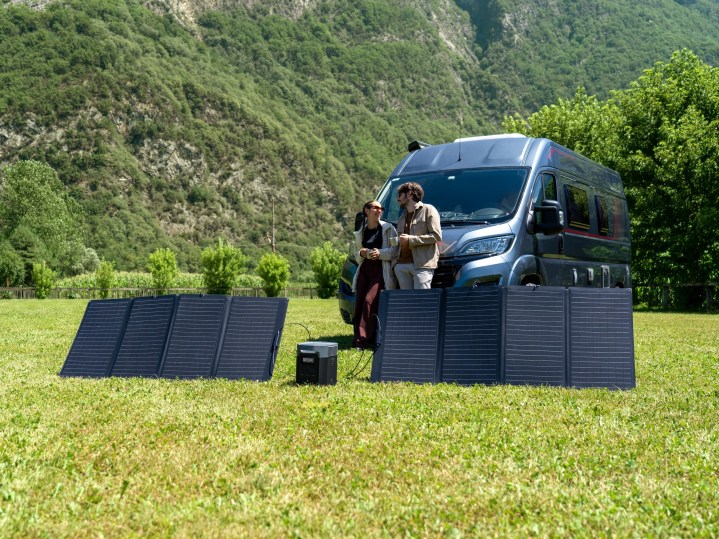
To think, DELTA was already industry-leading technology, but EcoFlow is really kicking things up a notch with the latest model. DELTA 2 charges much faster than comparable power stations, up to seven times faster to be precise. Most stations need about five to eight hours to charge to 80% capacity, but DELTA 2 can be charged from 0% to 80% in 50 minutes, or from 0% to 100% in 80 minutes. Even EcoFlow’s previous model, DELTA, takes an hour to charge to 80%, or 1.6 hours to charge to full, so already there’s a major improvement for the new generation.
Beyond that, it supports a 500-watt solar input, and this is compared to the OG DELTA’s 400-watt support. It means that solar panels, and solar energy, provide even greater charging support in the DELTA 2, and are capable of charging it to full in three to six hours. Just remember, DELTA takes four to eight hours to charge to full via solar panels. EcoFlow is making renewable energy more accessible, more capable, and frankly, better for all.
Higher: DELTA 2’s LFP battery and longer-lasting life cycle
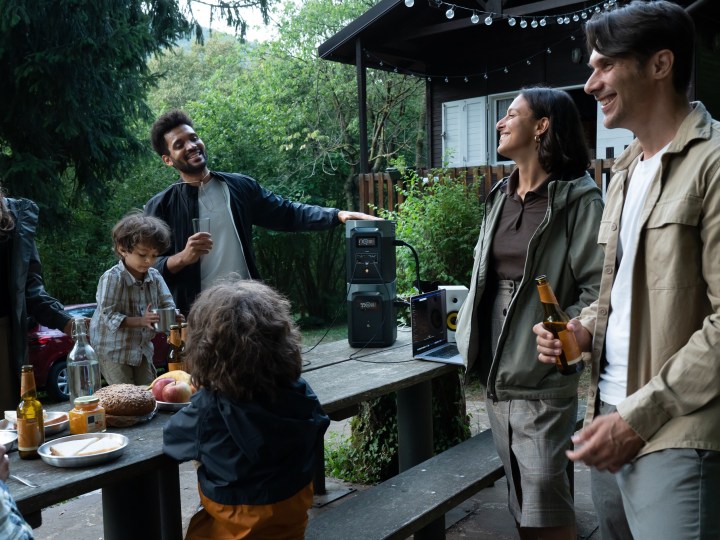
The DELTA 2 is EcoFlow’s first portable power station to use a LiFePO4 (LFP) battery, with a longer cycle life than the industry average, and even EcoFlow’s previous NMC-equipped DELTA power station. It takes 3,000 cycles to reach 80% capacity, which is six times as long as the industry average. LFP batteries are also considered safer, more stable, and more heat-resistant than competing options.
As if that wasn’t impressive enough, LFP batteries are also much lighter, making it faster and less burdensome to carry around the DELTA 2 or move camp. The DELTA 2 weighs only 27-pounds, compared to DELTA’s 30.9-pounds. It’s the best portable option for outdoor activities but also makes modular use so much better, as you can move the DELTA 2 around with ease.
Stronger: DELTA 2’s expandable possibilities explored

The DELTA 2 can power high-wattage devices with its 1,800-watt output, but let’s not forget it can also power smaller electronics like game consoles, laptops, routers, tablets, and beyond. That’s a big deal when you want to continue using your devices and there’s an outage happening, or if you’re out somewhere with no wall outlets and need to charge your gear. After all, that’s what true energy freedom is all about.
The original DELTA does have a high 1,260-watt-hour capacity, but it’s not expandable either. So, what you see is what you get there. The DELTA 2, on the other hand, has a fully modular capacity that you can completely double, simply by connecting the DELTA 2 Extra Battery. Add a DELTA 2 Max Extra Battery and suddenly that capacity triples. This expandable opportunity means that you can truly customize your system to meet your and your family’s power needs, via a super flexible system. You don’t have to buy an entirely new portable power station just to keep up with growing requirements. The DELTA 2 can power up to 15 devices simultaneously, as well, yet another upgrade over EcoFlow’s previous DELTA.
Not just a battery, but so much more
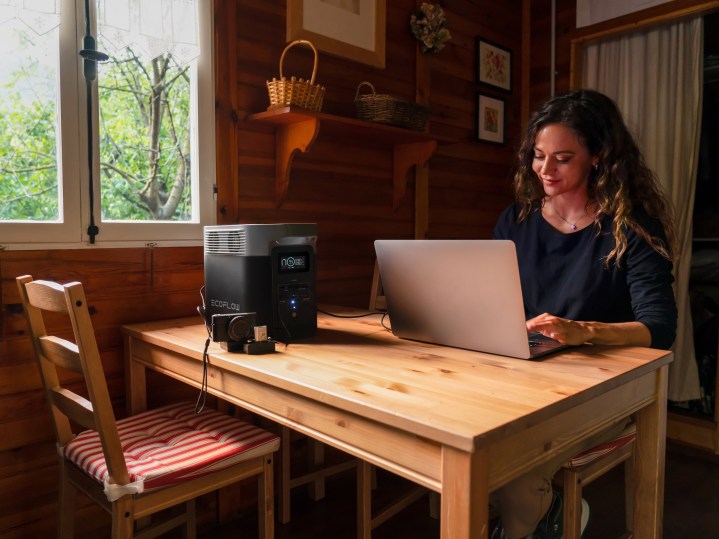
On top of the versatility, modularity, and fast-charging, DELTA 2 kicks things up a notch in the features department too:
- DELTA 2’s 1,800-watt AC output can power more than 90% of appliances
- Power up to 15 devices simultaneously across a span of electronics, appliances, and more
- The station can be fully charged in just three to six hours with a 500-watt solar input
- DELTA 2 has a lifetime of 3,000 battery cycles, which is six times as long as the industry average
- With the EPS (Emergency Power Supply) mode, in an outage or power event, DELTA 2 can restore power to appliances within 30 milliseconds
- It supports Wi-Fi and Bluetooth with the EcoFlow mobile app energy management
The DELTA 2 can transcend its purpose as a portable power station and become pretty much anything you want or need it to. It can be a mobile workstation, an outdoor theater, backup power for any scenario where you’d need it, and so much more. It’s not just a battery, it’s an essential appliance for every family.
DELTA 2 in the real world
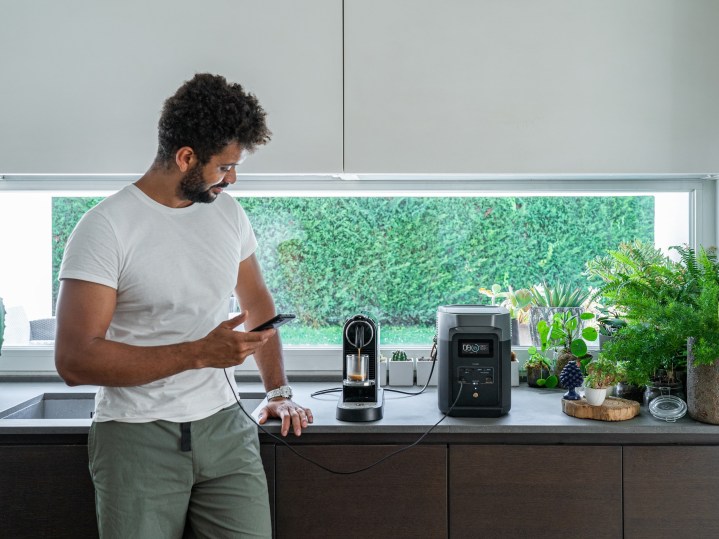
If you live in an area where the power is frequently going out, with rolling outages, then a portable power station is vital. If you’re living off-grid, it’s also necessary to keep your appliances, electronics, and essentials powered up. It’s also great if you travel, or if you’re going on a road trip. But again, most of these scenarios are straightforward and don’t explain why the average person should look into getting something like this.
With the rise of work-from-home opportunities, more people are spending time in home offices or working remotely elsewhere. At the same time, energy is a major concern right now, especially in certain areas. With DELTA 2, if there were to be an outage, you could continue powering the devices you need without losing any of your unsaved work or having a sudden productivity drop. You can still access power for your router, laptop, phone, and other appliances you need to do your work. Digital nomads gain a ton of freedom from a power station such as EcoFlow’s DELTA 2. Heck, you could even unplug from the normal grid and set up a workstation in your backyard, at a campsite, or on a desert island if you wish.
Regular home use is another great example. You can simply use the DELTA 2 as a backup power solution when outages hit your family home. Or, if you’re hosting a barbecue or get-together, it can power lights, speakers, and lots of other goodies to keep the entertainment going.
Outdoor adventures, camping, road trips, visiting family or friends, and neighborhood get-togethers are just a few additional activities where you might get out the DELTA 2 to power some gear.
If you’re already sold on the idea, EcoFlow’s DELTA 2 will be available starting September 16. If you just want to learn more, head over to EcoFlow’s website. Digital Trends readers can get 5% when ordering the DELTA 2 through EcoFlow’s website — just use promo code EFSD5OFF at checkout (valid from September 16 to October 14).


